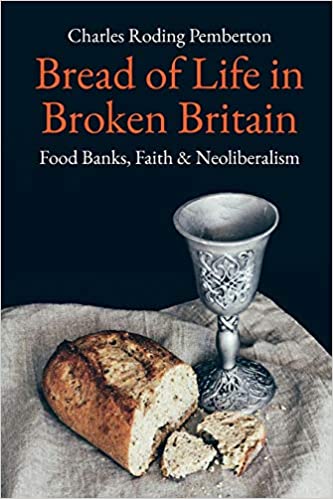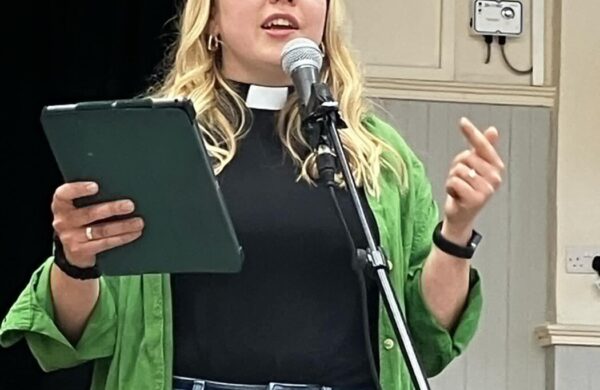Book review: Bread of Life in Broken Britain
Nick Waterfield, who manages a food bank in Sheffield's Parson Cross, reviews this new book by Charles Roding Pemberton (published by SCM Press).
Having been involved in food banks in Sheffield for 10 years, I always approach each new book, article or blog about them with a mix of both excited anticipation and concern. Excitement that the book might just offer me a new and refreshed insight, a new way forward, or – better still – a way out. Concern because too many of the stories reopen shared frustrations, disappointments, trauma and sadness for the lives of all those caught up in the food bank tide.
Justice for those on the margins of the neoliberal global model requires a Christian response that includes our personal and collective responses to both civic society and to God
This book is firstly theological; it is also unashamedly political and personal, as it argues these elements cannot and should not be falsely separated. Justice for those on the margins of the neoliberal global model requires a Christian response that includes our personal and collective responses to both civic society and to God. Although the title suggests a ‘Broken Britain’, the book itself reflects more widely upon a ‘broken’ world, or more accurately global system, dominated by neoliberal cultural norms and policy – a world where the pursuit of a particular kind of capitalism has taken root and changed human relations to society, towards each other, to creation and arguably to God.
Pemberton shares those all-too-familiar stories of food bank Britain with an honesty and humanity, spoken from his experience of County Durham Foodbank, a Trussell Trust food bank where he has been a volunteer. They display the humanity and the contradictions that many of us who are involved in foodbanks will recognise only too easily.
There is certainly no shortage of food involved in the issue of food insecurity
The book ties the international growth in food banks to the spread of neoliberal economics and culture, but importantly it argues that food banks occupy “contradictory spaces” facing both into and away from neoliberal ideology. It points out the international growth in food banks since the 1980s and 90s; it also tracks the corporate links within that international trail, with the likes of Walmart, Kellogs, Unilever, Coca Cola and Pepsico all playing their part. The book looks at the food industry as a whole, from production (in fact overproduction) to retail and all points of food waste in between, and points out how there is certainly no shortage of food involved in the issue of food insecurity.
At heart the book is a thorough theological and political reflection of food banks and the reason for them, and it offers up some genuine and thoughtful challenges to all of us, but especially those involved in the issues of food insecurity, poverty and marginalisation.
To what extent can food banks legitimately see themselves as eucharistic?
The book asks searching theological questions of the Christian community around food banks, questions that I know from personal experience many of us have been asking of ourselves for some time. Perhaps the biggest question it poses to Christians and churches involved in food banks is: to what extent can food banks legitimately see themselves as eucharistic?
The book invites us to each reassess how we see food, and to place it at the heart of our living faith
The book also invites us to each reassess how we see food, and to place it at the heart of our living faith. It challenges us to reconsider our consumption patterns around food, especially meat and dairy, and invites us to think about how through our actions we can make changes to our food production patterns to favour both planet and people. It offers for consideration policies such as UBI (Universal Basic Income) as a possible basis for a new Christian social justice policy approach, and suggests an alternative vision for reoccupying a space beyond neoliberalism, looking at land use, community allotments and growing spaces, and the development of a ‘land activist church’.
Pemberton has crafted a book that is scholarly but not dry and academic; it also feels deeply personal and heartfelt. As if to exemplify this, it contains small sketches (presumably by the author) which sometimes have little artistic merit or justification but offer, to me at least, a genuine sense of the personal reflection contained in the book. Each chapter is packed with references to other writings and pieces of research into food banks and the nature of poverty under neoliberal culture from the UK and overseas, as well as personal references to popular culture from The Life of Brian and the Terminator films to Bob Dylan.
If I were to find any faults in the book they would be minor. Pemberton’s experiences and examples of food banks are perhaps too tied to the Trussell Trust model of which he has been a part, with only passing reference to independent food bank responses that may (in some cases at least) present more of the qualities he rightly challenges for: open access without a ‘voucher system’ of referral, participation from those who also rely on food banks, and more. It also focuses on a very Anglican model of church, again this is to be understood as being from his own experience and tradition. Neither of these in my opinion detract from his central arguments, or in any way devalue the book.
If you’ve ever asked questions about what role the Church has within the food bank movement, this book is a good place to begin. On picking it up (as I said at the start) I’d hoped for refreshed insight, a new way forward or better still a way out. Maybe it’s unrealistic to expect one book to do all that – but at least this one is a start.





